Corporate Social Responsibility Report: Unilever's Initiatives
VerifiedAdded on 2023/06/09
|11
|2580
|396
Report
AI Summary
This report provides an in-depth analysis of Unilever's corporate social responsibility (CSR) efforts. It begins with an executive summary highlighting the importance of CSR for organizations, emphasizing the need to balance economic success with social responsibility. The report then delves into the introduction, defining CSR and its significance for businesses, especially consumer goods giants like Unilever. It explores the importance of CSR, emphasizing consumer awareness and expectations. The report examines the environmental factors, such as energy and water usage, waste management, and the adoption of eco-friendly production methods, alongside the social factors, including community development and philanthropic activities. It also analyzes the implications of Unilever's CSR strategies, focusing on stakeholder engagement, and offers recommendations for improvement, particularly regarding water usage, philanthropic activities, and waste management. The report concludes by reiterating the importance of CSR and its role in achieving customer satisfaction and long-term success. The report uses references from various authors to support its findings.
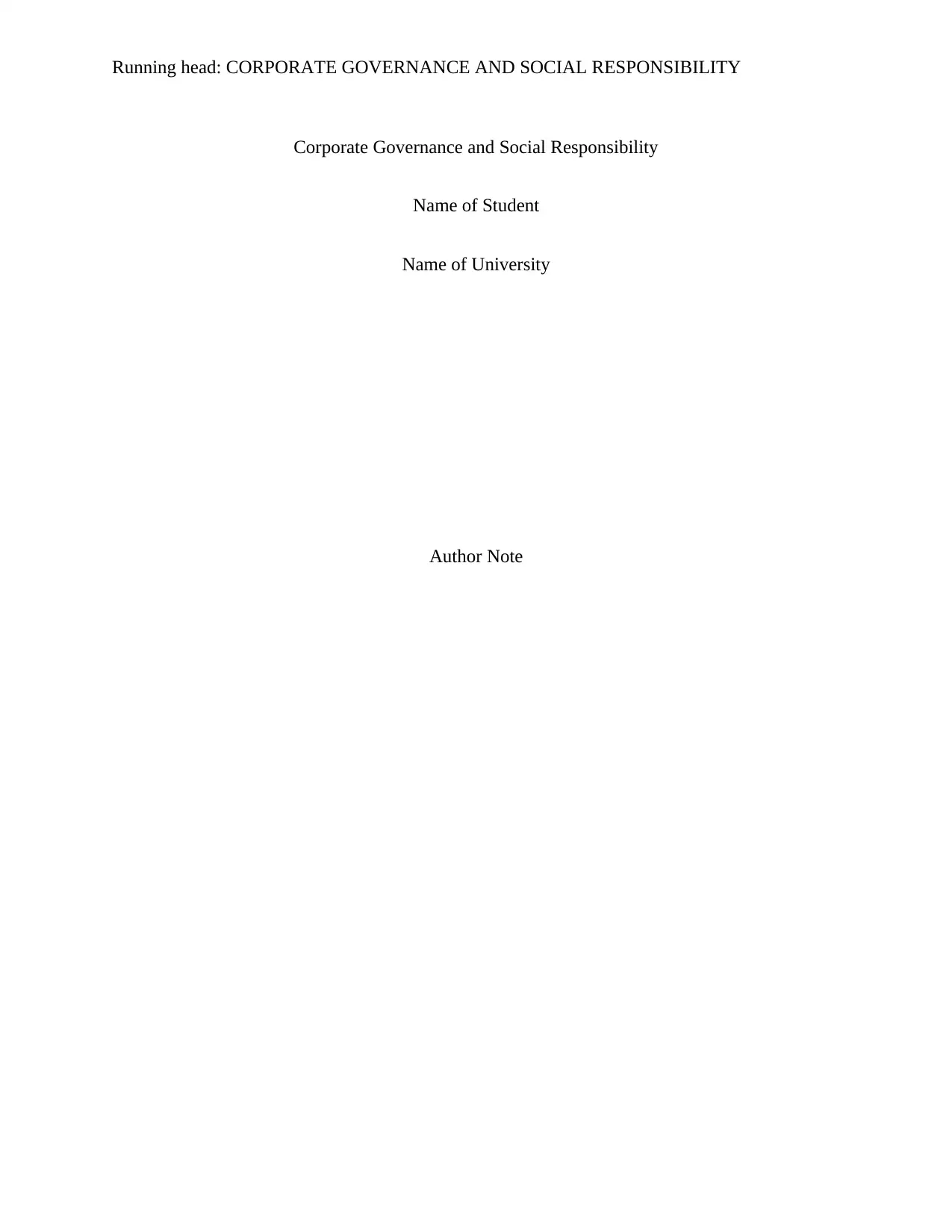
Running head: CORPORATE GOVERNANCE AND SOCIAL RESPONSIBILITY
Corporate Governance and Social Responsibility
Name of Student
Name of University
Author Note
Corporate Governance and Social Responsibility
Name of Student
Name of University
Author Note
Paraphrase This Document
Need a fresh take? Get an instant paraphrase of this document with our AI Paraphraser
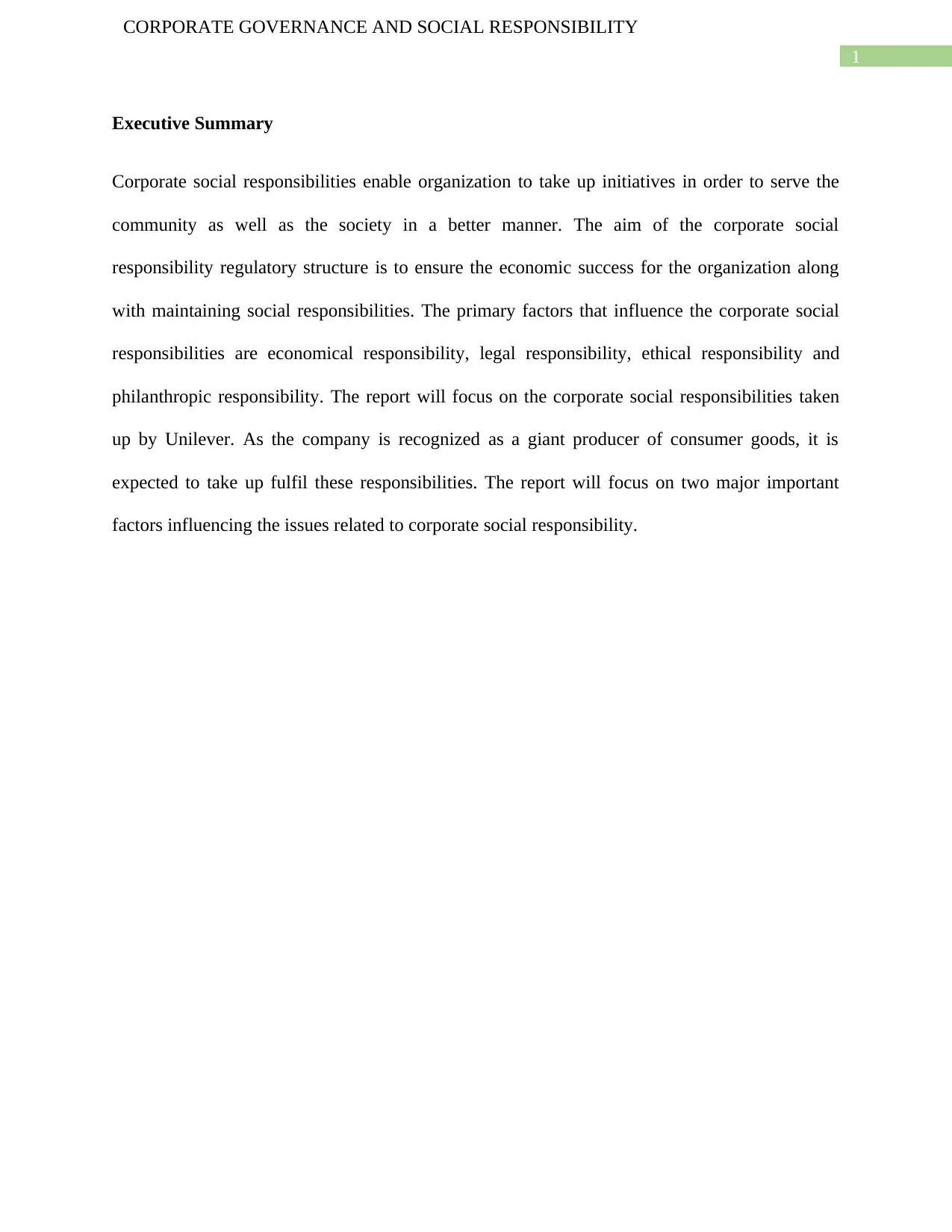
1
CORPORATE GOVERNANCE AND SOCIAL RESPONSIBILITY
Executive Summary
Corporate social responsibilities enable organization to take up initiatives in order to serve the
community as well as the society in a better manner. The aim of the corporate social
responsibility regulatory structure is to ensure the economic success for the organization along
with maintaining social responsibilities. The primary factors that influence the corporate social
responsibilities are economical responsibility, legal responsibility, ethical responsibility and
philanthropic responsibility. The report will focus on the corporate social responsibilities taken
up by Unilever. As the company is recognized as a giant producer of consumer goods, it is
expected to take up fulfil these responsibilities. The report will focus on two major important
factors influencing the issues related to corporate social responsibility.
CORPORATE GOVERNANCE AND SOCIAL RESPONSIBILITY
Executive Summary
Corporate social responsibilities enable organization to take up initiatives in order to serve the
community as well as the society in a better manner. The aim of the corporate social
responsibility regulatory structure is to ensure the economic success for the organization along
with maintaining social responsibilities. The primary factors that influence the corporate social
responsibilities are economical responsibility, legal responsibility, ethical responsibility and
philanthropic responsibility. The report will focus on the corporate social responsibilities taken
up by Unilever. As the company is recognized as a giant producer of consumer goods, it is
expected to take up fulfil these responsibilities. The report will focus on two major important
factors influencing the issues related to corporate social responsibility.
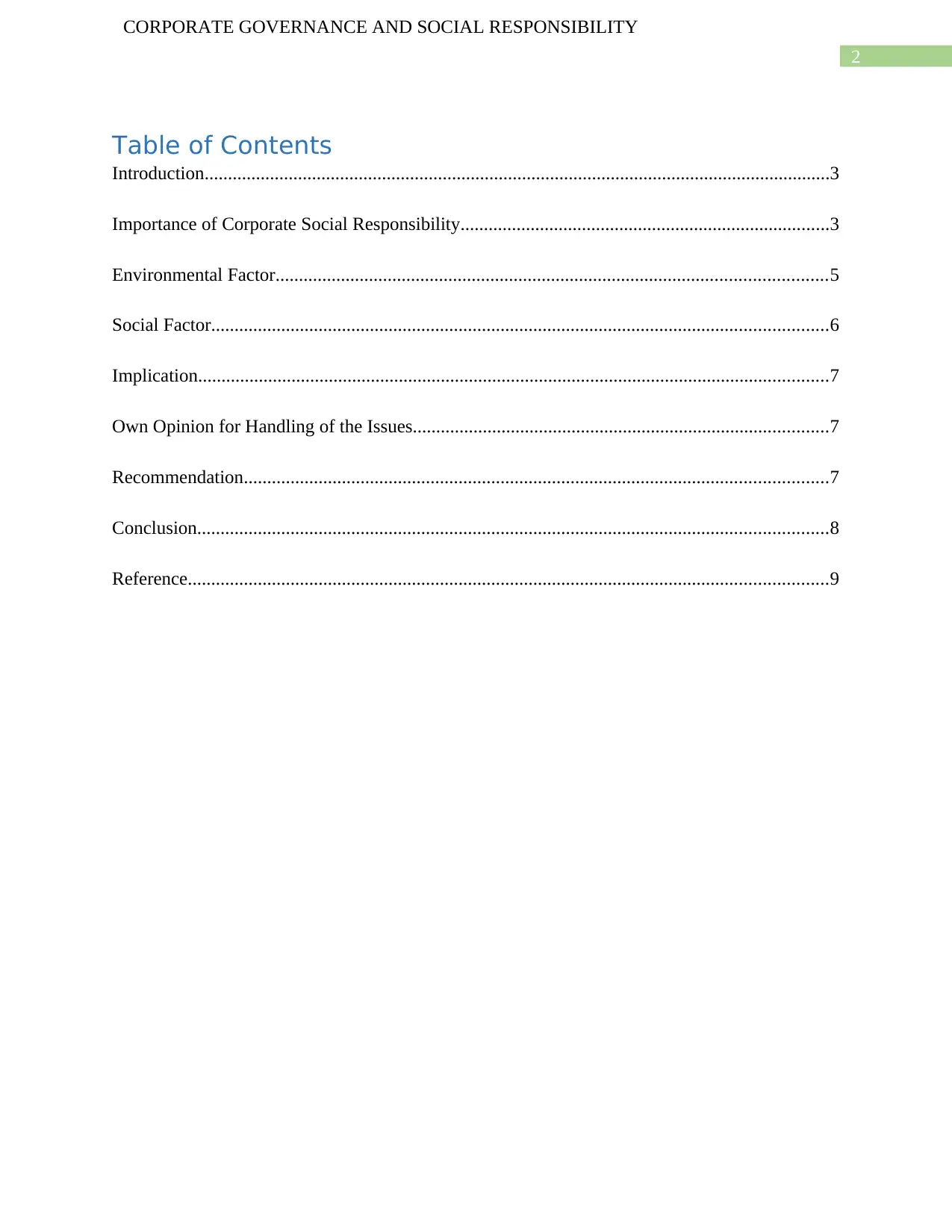
2
CORPORATE GOVERNANCE AND SOCIAL RESPONSIBILITY
Table of Contents
Introduction......................................................................................................................................3
Importance of Corporate Social Responsibility...............................................................................3
Environmental Factor......................................................................................................................5
Social Factor....................................................................................................................................6
Implication.......................................................................................................................................7
Own Opinion for Handling of the Issues.........................................................................................7
Recommendation.............................................................................................................................7
Conclusion.......................................................................................................................................8
Reference.........................................................................................................................................9
CORPORATE GOVERNANCE AND SOCIAL RESPONSIBILITY
Table of Contents
Introduction......................................................................................................................................3
Importance of Corporate Social Responsibility...............................................................................3
Environmental Factor......................................................................................................................5
Social Factor....................................................................................................................................6
Implication.......................................................................................................................................7
Own Opinion for Handling of the Issues.........................................................................................7
Recommendation.............................................................................................................................7
Conclusion.......................................................................................................................................8
Reference.........................................................................................................................................9
⊘ This is a preview!⊘
Do you want full access?
Subscribe today to unlock all pages.

Trusted by 1+ million students worldwide
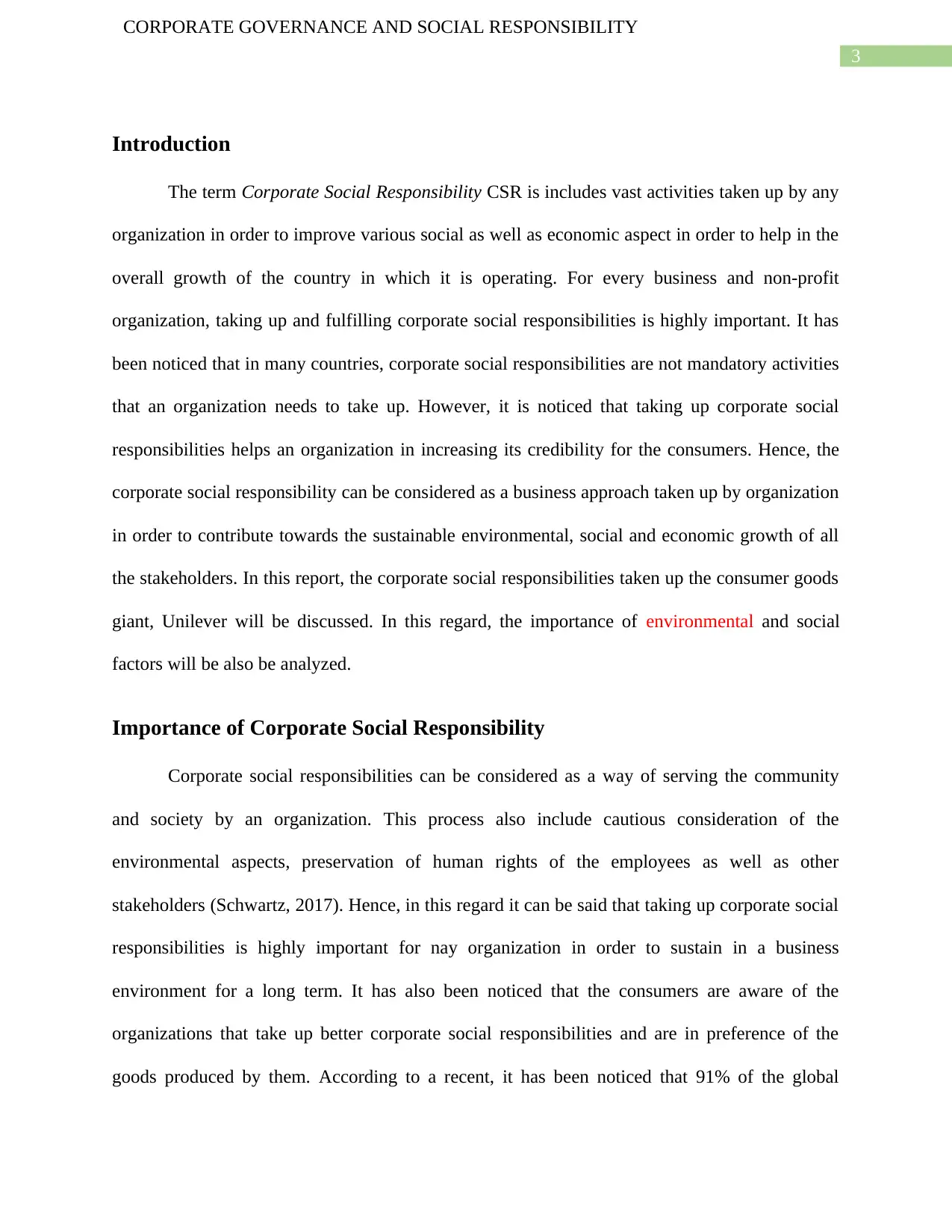
3
CORPORATE GOVERNANCE AND SOCIAL RESPONSIBILITY
Introduction
The term Corporate Social Responsibility CSR is includes vast activities taken up by any
organization in order to improve various social as well as economic aspect in order to help in the
overall growth of the country in which it is operating. For every business and non-profit
organization, taking up and fulfilling corporate social responsibilities is highly important. It has
been noticed that in many countries, corporate social responsibilities are not mandatory activities
that an organization needs to take up. However, it is noticed that taking up corporate social
responsibilities helps an organization in increasing its credibility for the consumers. Hence, the
corporate social responsibility can be considered as a business approach taken up by organization
in order to contribute towards the sustainable environmental, social and economic growth of all
the stakeholders. In this report, the corporate social responsibilities taken up the consumer goods
giant, Unilever will be discussed. In this regard, the importance of environmental and social
factors will be also be analyzed.
Importance of Corporate Social Responsibility
Corporate social responsibilities can be considered as a way of serving the community
and society by an organization. This process also include cautious consideration of the
environmental aspects, preservation of human rights of the employees as well as other
stakeholders (Schwartz, 2017). Hence, in this regard it can be said that taking up corporate social
responsibilities is highly important for nay organization in order to sustain in a business
environment for a long term. It has also been noticed that the consumers are aware of the
organizations that take up better corporate social responsibilities and are in preference of the
goods produced by them. According to a recent, it has been noticed that 91% of the global
CORPORATE GOVERNANCE AND SOCIAL RESPONSIBILITY
Introduction
The term Corporate Social Responsibility CSR is includes vast activities taken up by any
organization in order to improve various social as well as economic aspect in order to help in the
overall growth of the country in which it is operating. For every business and non-profit
organization, taking up and fulfilling corporate social responsibilities is highly important. It has
been noticed that in many countries, corporate social responsibilities are not mandatory activities
that an organization needs to take up. However, it is noticed that taking up corporate social
responsibilities helps an organization in increasing its credibility for the consumers. Hence, the
corporate social responsibility can be considered as a business approach taken up by organization
in order to contribute towards the sustainable environmental, social and economic growth of all
the stakeholders. In this report, the corporate social responsibilities taken up the consumer goods
giant, Unilever will be discussed. In this regard, the importance of environmental and social
factors will be also be analyzed.
Importance of Corporate Social Responsibility
Corporate social responsibilities can be considered as a way of serving the community
and society by an organization. This process also include cautious consideration of the
environmental aspects, preservation of human rights of the employees as well as other
stakeholders (Schwartz, 2017). Hence, in this regard it can be said that taking up corporate social
responsibilities is highly important for nay organization in order to sustain in a business
environment for a long term. It has also been noticed that the consumers are aware of the
organizations that take up better corporate social responsibilities and are in preference of the
goods produced by them. According to a recent, it has been noticed that 91% of the global
Paraphrase This Document
Need a fresh take? Get an instant paraphrase of this document with our AI Paraphraser
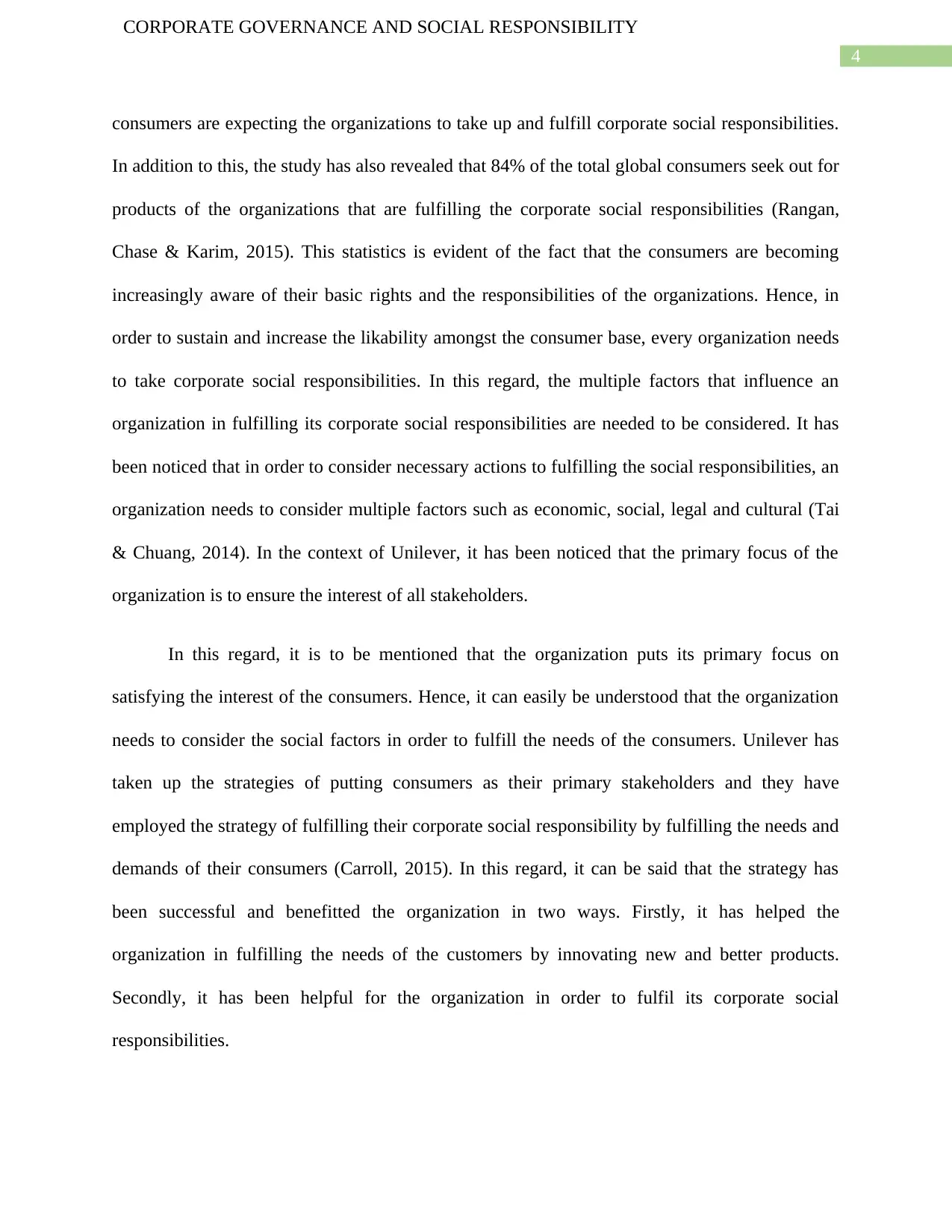
4
CORPORATE GOVERNANCE AND SOCIAL RESPONSIBILITY
consumers are expecting the organizations to take up and fulfill corporate social responsibilities.
In addition to this, the study has also revealed that 84% of the total global consumers seek out for
products of the organizations that are fulfilling the corporate social responsibilities (Rangan,
Chase & Karim, 2015). This statistics is evident of the fact that the consumers are becoming
increasingly aware of their basic rights and the responsibilities of the organizations. Hence, in
order to sustain and increase the likability amongst the consumer base, every organization needs
to take corporate social responsibilities. In this regard, the multiple factors that influence an
organization in fulfilling its corporate social responsibilities are needed to be considered. It has
been noticed that in order to consider necessary actions to fulfilling the social responsibilities, an
organization needs to consider multiple factors such as economic, social, legal and cultural (Tai
& Chuang, 2014). In the context of Unilever, it has been noticed that the primary focus of the
organization is to ensure the interest of all stakeholders.
In this regard, it is to be mentioned that the organization puts its primary focus on
satisfying the interest of the consumers. Hence, it can easily be understood that the organization
needs to consider the social factors in order to fulfill the needs of the consumers. Unilever has
taken up the strategies of putting consumers as their primary stakeholders and they have
employed the strategy of fulfilling their corporate social responsibility by fulfilling the needs and
demands of their consumers (Carroll, 2015). In this regard, it can be said that the strategy has
been successful and benefitted the organization in two ways. Firstly, it has helped the
organization in fulfilling the needs of the customers by innovating new and better products.
Secondly, it has been helpful for the organization in order to fulfil its corporate social
responsibilities.
CORPORATE GOVERNANCE AND SOCIAL RESPONSIBILITY
consumers are expecting the organizations to take up and fulfill corporate social responsibilities.
In addition to this, the study has also revealed that 84% of the total global consumers seek out for
products of the organizations that are fulfilling the corporate social responsibilities (Rangan,
Chase & Karim, 2015). This statistics is evident of the fact that the consumers are becoming
increasingly aware of their basic rights and the responsibilities of the organizations. Hence, in
order to sustain and increase the likability amongst the consumer base, every organization needs
to take corporate social responsibilities. In this regard, the multiple factors that influence an
organization in fulfilling its corporate social responsibilities are needed to be considered. It has
been noticed that in order to consider necessary actions to fulfilling the social responsibilities, an
organization needs to consider multiple factors such as economic, social, legal and cultural (Tai
& Chuang, 2014). In the context of Unilever, it has been noticed that the primary focus of the
organization is to ensure the interest of all stakeholders.
In this regard, it is to be mentioned that the organization puts its primary focus on
satisfying the interest of the consumers. Hence, it can easily be understood that the organization
needs to consider the social factors in order to fulfill the needs of the consumers. Unilever has
taken up the strategies of putting consumers as their primary stakeholders and they have
employed the strategy of fulfilling their corporate social responsibility by fulfilling the needs and
demands of their consumers (Carroll, 2015). In this regard, it can be said that the strategy has
been successful and benefitted the organization in two ways. Firstly, it has helped the
organization in fulfilling the needs of the customers by innovating new and better products.
Secondly, it has been helpful for the organization in order to fulfil its corporate social
responsibilities.
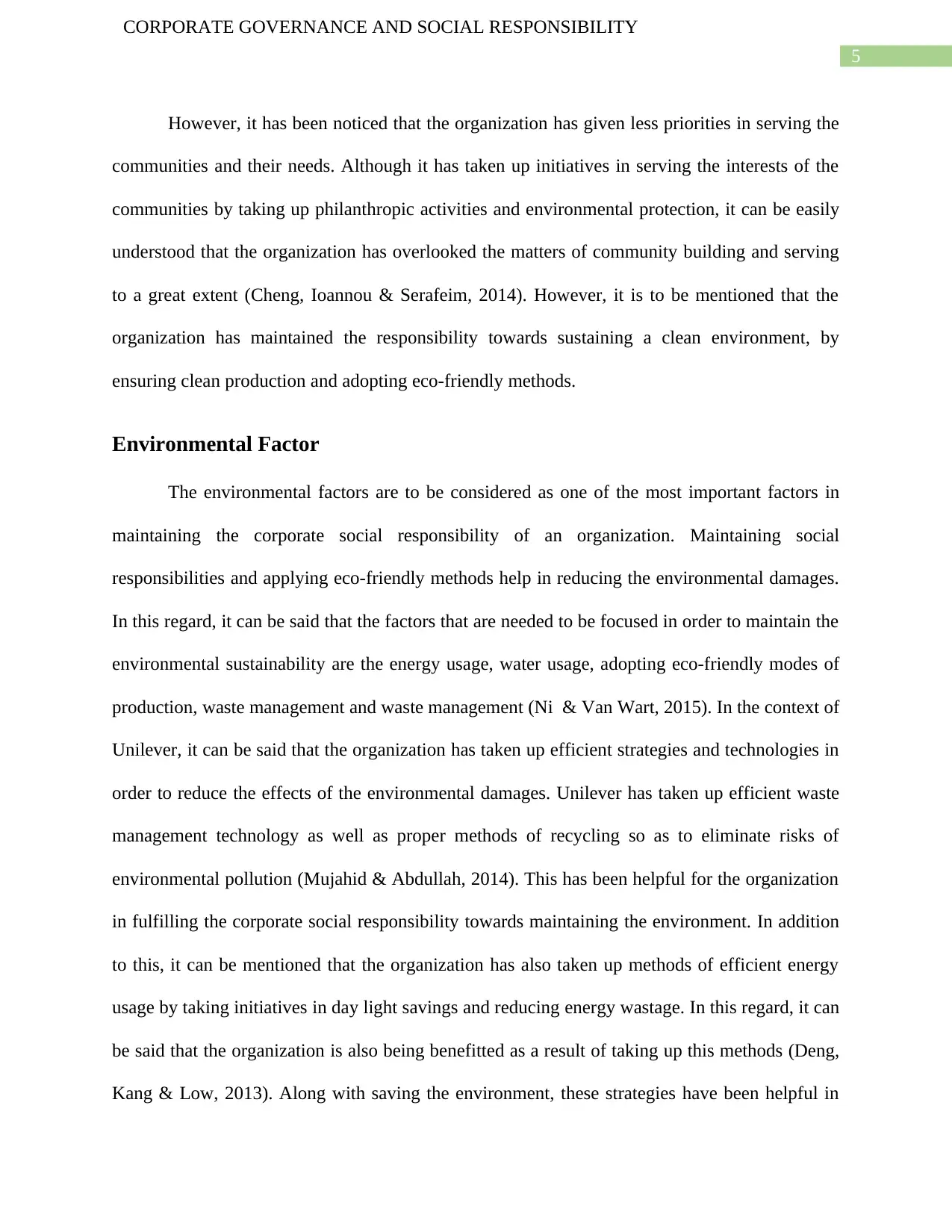
5
CORPORATE GOVERNANCE AND SOCIAL RESPONSIBILITY
However, it has been noticed that the organization has given less priorities in serving the
communities and their needs. Although it has taken up initiatives in serving the interests of the
communities by taking up philanthropic activities and environmental protection, it can be easily
understood that the organization has overlooked the matters of community building and serving
to a great extent (Cheng, Ioannou & Serafeim, 2014). However, it is to be mentioned that the
organization has maintained the responsibility towards sustaining a clean environment, by
ensuring clean production and adopting eco-friendly methods.
Environmental Factor
The environmental factors are to be considered as one of the most important factors in
maintaining the corporate social responsibility of an organization. Maintaining social
responsibilities and applying eco-friendly methods help in reducing the environmental damages.
In this regard, it can be said that the factors that are needed to be focused in order to maintain the
environmental sustainability are the energy usage, water usage, adopting eco-friendly modes of
production, waste management and waste management (Ni & Van Wart, 2015). In the context of
Unilever, it can be said that the organization has taken up efficient strategies and technologies in
order to reduce the effects of the environmental damages. Unilever has taken up efficient waste
management technology as well as proper methods of recycling so as to eliminate risks of
environmental pollution (Mujahid & Abdullah, 2014). This has been helpful for the organization
in fulfilling the corporate social responsibility towards maintaining the environment. In addition
to this, it can be mentioned that the organization has also taken up methods of efficient energy
usage by taking initiatives in day light savings and reducing energy wastage. In this regard, it can
be said that the organization is also being benefitted as a result of taking up this methods (Deng,
Kang & Low, 2013). Along with saving the environment, these strategies have been helpful in
CORPORATE GOVERNANCE AND SOCIAL RESPONSIBILITY
However, it has been noticed that the organization has given less priorities in serving the
communities and their needs. Although it has taken up initiatives in serving the interests of the
communities by taking up philanthropic activities and environmental protection, it can be easily
understood that the organization has overlooked the matters of community building and serving
to a great extent (Cheng, Ioannou & Serafeim, 2014). However, it is to be mentioned that the
organization has maintained the responsibility towards sustaining a clean environment, by
ensuring clean production and adopting eco-friendly methods.
Environmental Factor
The environmental factors are to be considered as one of the most important factors in
maintaining the corporate social responsibility of an organization. Maintaining social
responsibilities and applying eco-friendly methods help in reducing the environmental damages.
In this regard, it can be said that the factors that are needed to be focused in order to maintain the
environmental sustainability are the energy usage, water usage, adopting eco-friendly modes of
production, waste management and waste management (Ni & Van Wart, 2015). In the context of
Unilever, it can be said that the organization has taken up efficient strategies and technologies in
order to reduce the effects of the environmental damages. Unilever has taken up efficient waste
management technology as well as proper methods of recycling so as to eliminate risks of
environmental pollution (Mujahid & Abdullah, 2014). This has been helpful for the organization
in fulfilling the corporate social responsibility towards maintaining the environment. In addition
to this, it can be mentioned that the organization has also taken up methods of efficient energy
usage by taking initiatives in day light savings and reducing energy wastage. In this regard, it can
be said that the organization is also being benefitted as a result of taking up this methods (Deng,
Kang & Low, 2013). Along with saving the environment, these strategies have been helpful in
⊘ This is a preview!⊘
Do you want full access?
Subscribe today to unlock all pages.

Trusted by 1+ million students worldwide
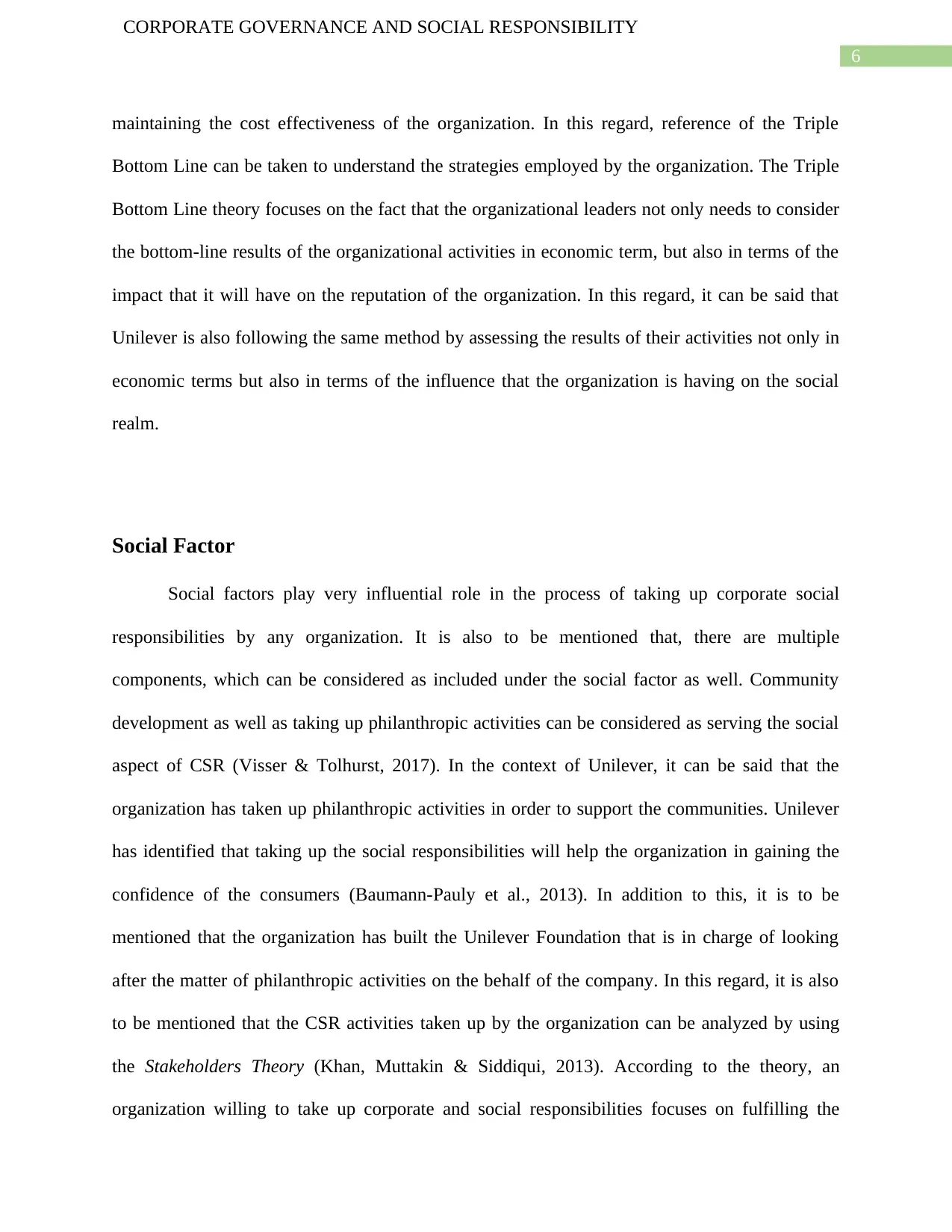
6
CORPORATE GOVERNANCE AND SOCIAL RESPONSIBILITY
maintaining the cost effectiveness of the organization. In this regard, reference of the Triple
Bottom Line can be taken to understand the strategies employed by the organization. The Triple
Bottom Line theory focuses on the fact that the organizational leaders not only needs to consider
the bottom-line results of the organizational activities in economic term, but also in terms of the
impact that it will have on the reputation of the organization. In this regard, it can be said that
Unilever is also following the same method by assessing the results of their activities not only in
economic terms but also in terms of the influence that the organization is having on the social
realm.
Social Factor
Social factors play very influential role in the process of taking up corporate social
responsibilities by any organization. It is also to be mentioned that, there are multiple
components, which can be considered as included under the social factor as well. Community
development as well as taking up philanthropic activities can be considered as serving the social
aspect of CSR (Visser & Tolhurst, 2017). In the context of Unilever, it can be said that the
organization has taken up philanthropic activities in order to support the communities. Unilever
has identified that taking up the social responsibilities will help the organization in gaining the
confidence of the consumers (Baumann-Pauly et al., 2013). In addition to this, it is to be
mentioned that the organization has built the Unilever Foundation that is in charge of looking
after the matter of philanthropic activities on the behalf of the company. In this regard, it is also
to be mentioned that the CSR activities taken up by the organization can be analyzed by using
the Stakeholders Theory (Khan, Muttakin & Siddiqui, 2013). According to the theory, an
organization willing to take up corporate and social responsibilities focuses on fulfilling the
CORPORATE GOVERNANCE AND SOCIAL RESPONSIBILITY
maintaining the cost effectiveness of the organization. In this regard, reference of the Triple
Bottom Line can be taken to understand the strategies employed by the organization. The Triple
Bottom Line theory focuses on the fact that the organizational leaders not only needs to consider
the bottom-line results of the organizational activities in economic term, but also in terms of the
impact that it will have on the reputation of the organization. In this regard, it can be said that
Unilever is also following the same method by assessing the results of their activities not only in
economic terms but also in terms of the influence that the organization is having on the social
realm.
Social Factor
Social factors play very influential role in the process of taking up corporate social
responsibilities by any organization. It is also to be mentioned that, there are multiple
components, which can be considered as included under the social factor as well. Community
development as well as taking up philanthropic activities can be considered as serving the social
aspect of CSR (Visser & Tolhurst, 2017). In the context of Unilever, it can be said that the
organization has taken up philanthropic activities in order to support the communities. Unilever
has identified that taking up the social responsibilities will help the organization in gaining the
confidence of the consumers (Baumann-Pauly et al., 2013). In addition to this, it is to be
mentioned that the organization has built the Unilever Foundation that is in charge of looking
after the matter of philanthropic activities on the behalf of the company. In this regard, it is also
to be mentioned that the CSR activities taken up by the organization can be analyzed by using
the Stakeholders Theory (Khan, Muttakin & Siddiqui, 2013). According to the theory, an
organization willing to take up corporate and social responsibilities focuses on fulfilling the
Paraphrase This Document
Need a fresh take? Get an instant paraphrase of this document with our AI Paraphraser
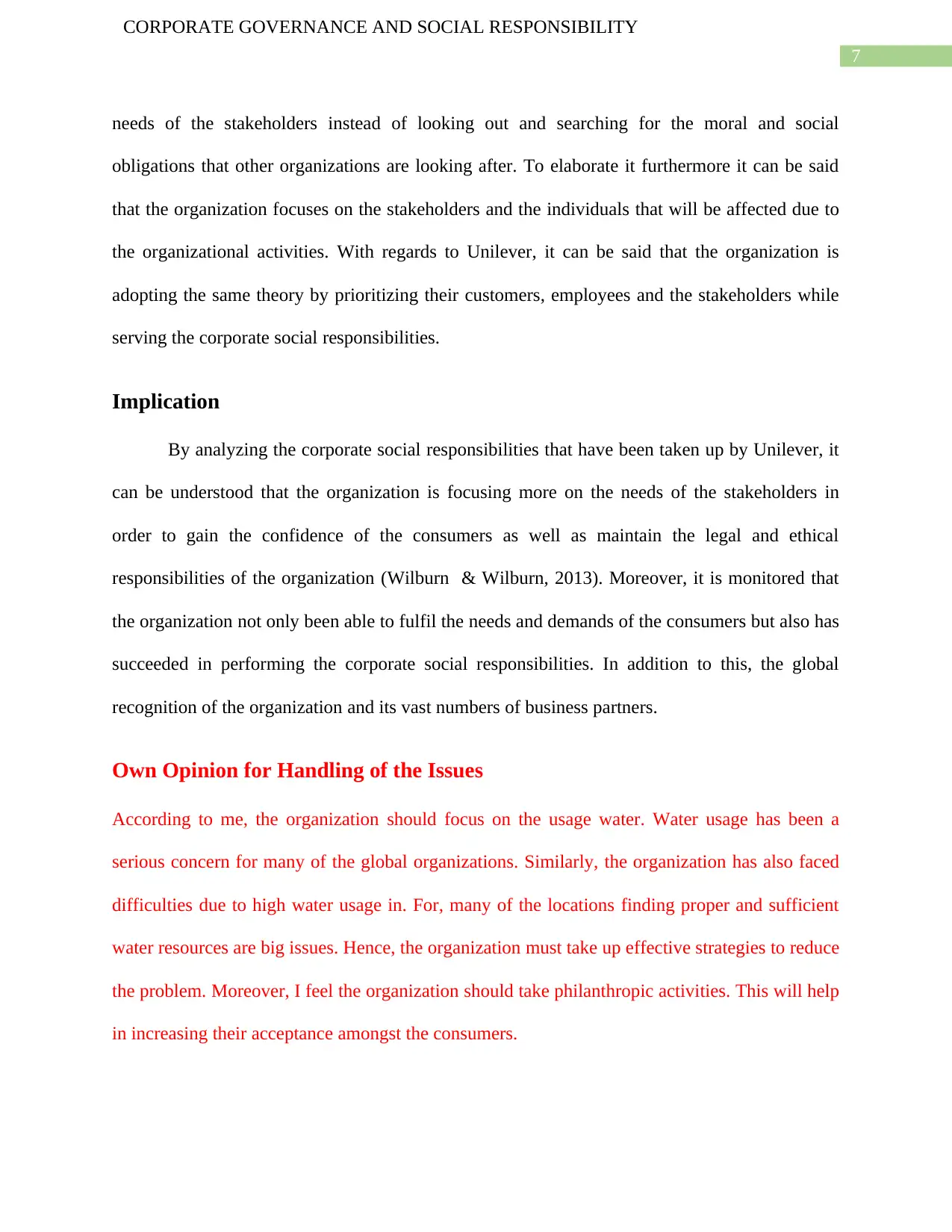
7
CORPORATE GOVERNANCE AND SOCIAL RESPONSIBILITY
needs of the stakeholders instead of looking out and searching for the moral and social
obligations that other organizations are looking after. To elaborate it furthermore it can be said
that the organization focuses on the stakeholders and the individuals that will be affected due to
the organizational activities. With regards to Unilever, it can be said that the organization is
adopting the same theory by prioritizing their customers, employees and the stakeholders while
serving the corporate social responsibilities.
Implication
By analyzing the corporate social responsibilities that have been taken up by Unilever, it
can be understood that the organization is focusing more on the needs of the stakeholders in
order to gain the confidence of the consumers as well as maintain the legal and ethical
responsibilities of the organization (Wilburn & Wilburn, 2013). Moreover, it is monitored that
the organization not only been able to fulfil the needs and demands of the consumers but also has
succeeded in performing the corporate social responsibilities. In addition to this, the global
recognition of the organization and its vast numbers of business partners.
Own Opinion for Handling of the Issues
According to me, the organization should focus on the usage water. Water usage has been a
serious concern for many of the global organizations. Similarly, the organization has also faced
difficulties due to high water usage in. For, many of the locations finding proper and sufficient
water resources are big issues. Hence, the organization must take up effective strategies to reduce
the problem. Moreover, I feel the organization should take philanthropic activities. This will help
in increasing their acceptance amongst the consumers.
CORPORATE GOVERNANCE AND SOCIAL RESPONSIBILITY
needs of the stakeholders instead of looking out and searching for the moral and social
obligations that other organizations are looking after. To elaborate it furthermore it can be said
that the organization focuses on the stakeholders and the individuals that will be affected due to
the organizational activities. With regards to Unilever, it can be said that the organization is
adopting the same theory by prioritizing their customers, employees and the stakeholders while
serving the corporate social responsibilities.
Implication
By analyzing the corporate social responsibilities that have been taken up by Unilever, it
can be understood that the organization is focusing more on the needs of the stakeholders in
order to gain the confidence of the consumers as well as maintain the legal and ethical
responsibilities of the organization (Wilburn & Wilburn, 2013). Moreover, it is monitored that
the organization not only been able to fulfil the needs and demands of the consumers but also has
succeeded in performing the corporate social responsibilities. In addition to this, the global
recognition of the organization and its vast numbers of business partners.
Own Opinion for Handling of the Issues
According to me, the organization should focus on the usage water. Water usage has been a
serious concern for many of the global organizations. Similarly, the organization has also faced
difficulties due to high water usage in. For, many of the locations finding proper and sufficient
water resources are big issues. Hence, the organization must take up effective strategies to reduce
the problem. Moreover, I feel the organization should take philanthropic activities. This will help
in increasing their acceptance amongst the consumers.
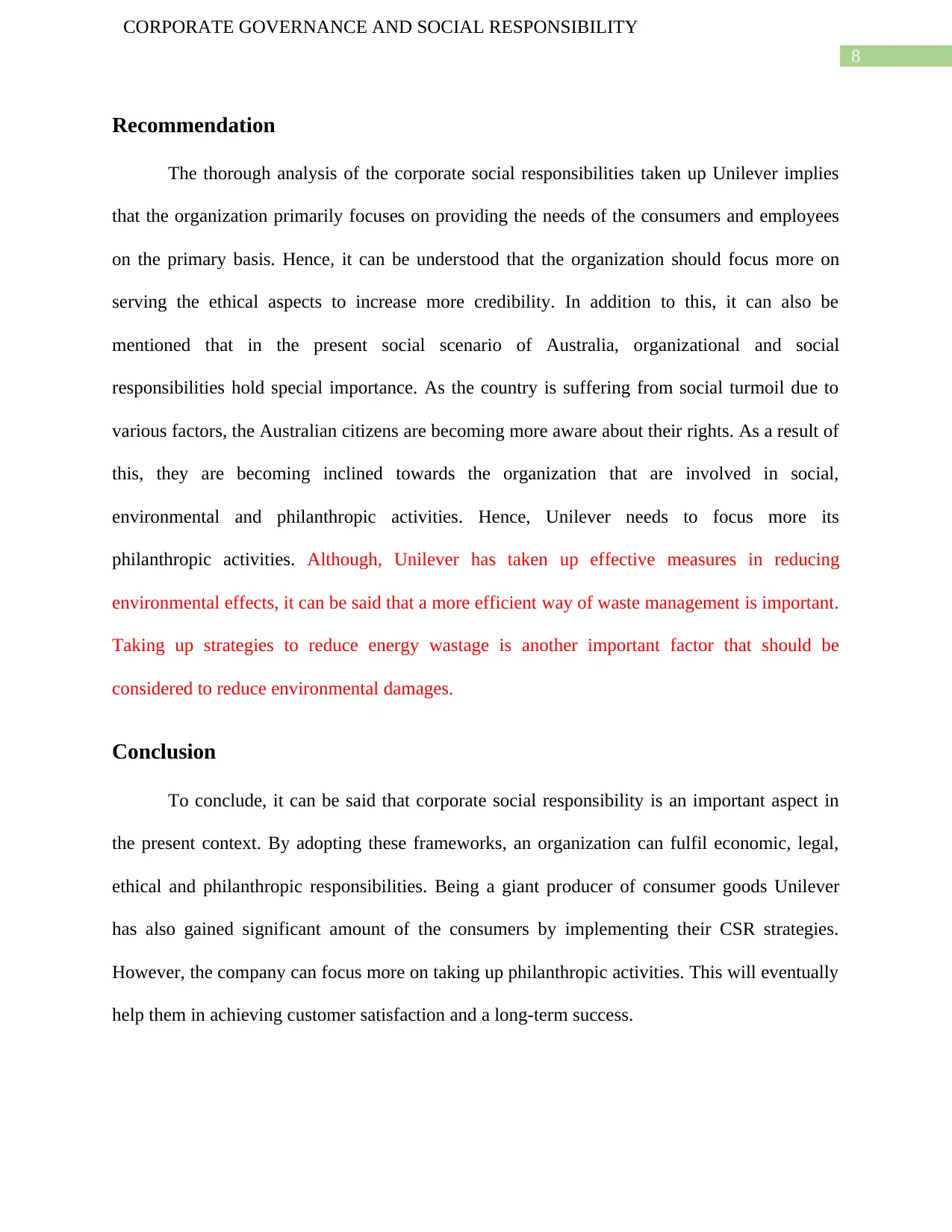
8
CORPORATE GOVERNANCE AND SOCIAL RESPONSIBILITY
Recommendation
The thorough analysis of the corporate social responsibilities taken up Unilever implies
that the organization primarily focuses on providing the needs of the consumers and employees
on the primary basis. Hence, it can be understood that the organization should focus more on
serving the ethical aspects to increase more credibility. In addition to this, it can also be
mentioned that in the present social scenario of Australia, organizational and social
responsibilities hold special importance. As the country is suffering from social turmoil due to
various factors, the Australian citizens are becoming more aware about their rights. As a result of
this, they are becoming inclined towards the organization that are involved in social,
environmental and philanthropic activities. Hence, Unilever needs to focus more its
philanthropic activities. Although, Unilever has taken up effective measures in reducing
environmental effects, it can be said that a more efficient way of waste management is important.
Taking up strategies to reduce energy wastage is another important factor that should be
considered to reduce environmental damages.
Conclusion
To conclude, it can be said that corporate social responsibility is an important aspect in
the present context. By adopting these frameworks, an organization can fulfil economic, legal,
ethical and philanthropic responsibilities. Being a giant producer of consumer goods Unilever
has also gained significant amount of the consumers by implementing their CSR strategies.
However, the company can focus more on taking up philanthropic activities. This will eventually
help them in achieving customer satisfaction and a long-term success.
CORPORATE GOVERNANCE AND SOCIAL RESPONSIBILITY
Recommendation
The thorough analysis of the corporate social responsibilities taken up Unilever implies
that the organization primarily focuses on providing the needs of the consumers and employees
on the primary basis. Hence, it can be understood that the organization should focus more on
serving the ethical aspects to increase more credibility. In addition to this, it can also be
mentioned that in the present social scenario of Australia, organizational and social
responsibilities hold special importance. As the country is suffering from social turmoil due to
various factors, the Australian citizens are becoming more aware about their rights. As a result of
this, they are becoming inclined towards the organization that are involved in social,
environmental and philanthropic activities. Hence, Unilever needs to focus more its
philanthropic activities. Although, Unilever has taken up effective measures in reducing
environmental effects, it can be said that a more efficient way of waste management is important.
Taking up strategies to reduce energy wastage is another important factor that should be
considered to reduce environmental damages.
Conclusion
To conclude, it can be said that corporate social responsibility is an important aspect in
the present context. By adopting these frameworks, an organization can fulfil economic, legal,
ethical and philanthropic responsibilities. Being a giant producer of consumer goods Unilever
has also gained significant amount of the consumers by implementing their CSR strategies.
However, the company can focus more on taking up philanthropic activities. This will eventually
help them in achieving customer satisfaction and a long-term success.
⊘ This is a preview!⊘
Do you want full access?
Subscribe today to unlock all pages.

Trusted by 1+ million students worldwide
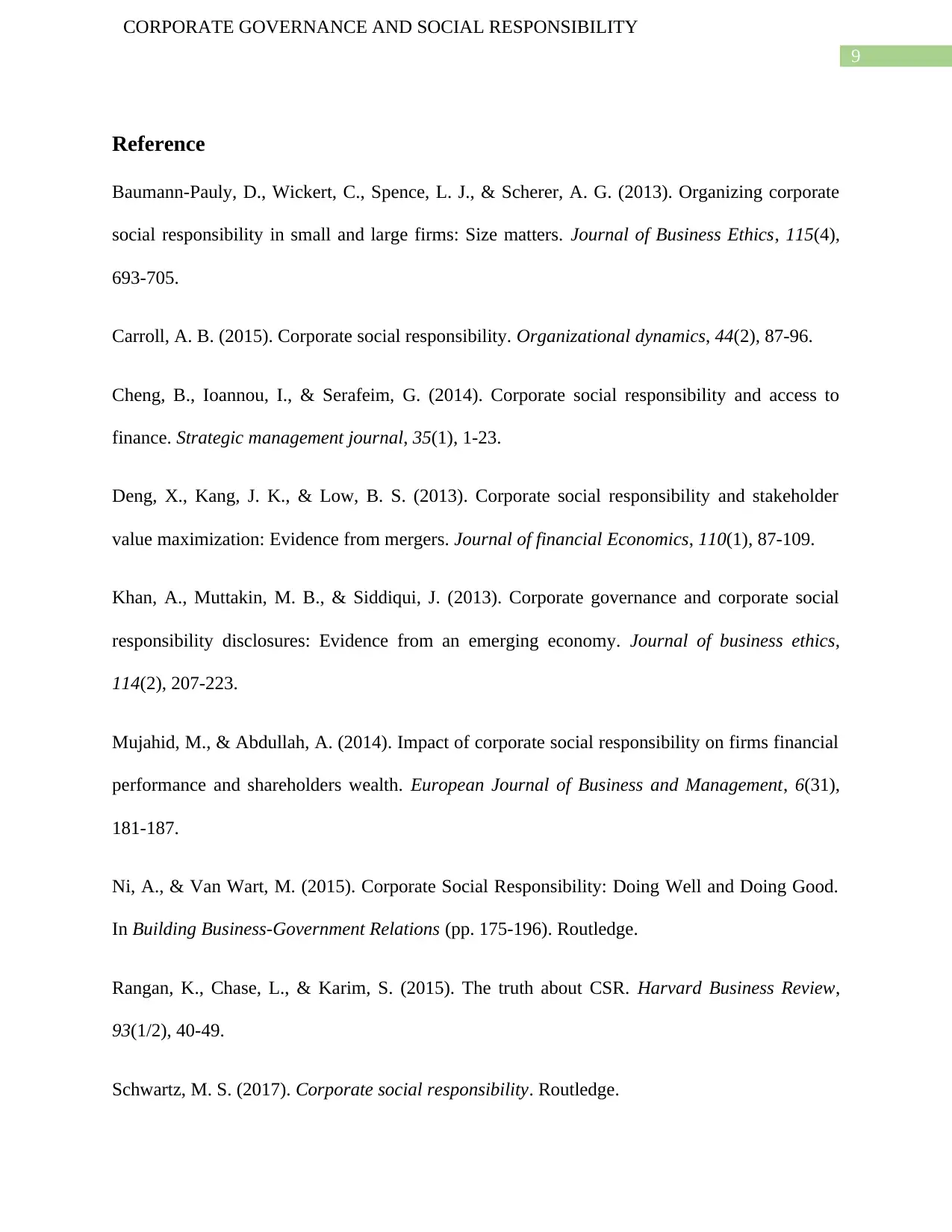
9
CORPORATE GOVERNANCE AND SOCIAL RESPONSIBILITY
Reference
Baumann-Pauly, D., Wickert, C., Spence, L. J., & Scherer, A. G. (2013). Organizing corporate
social responsibility in small and large firms: Size matters. Journal of Business Ethics, 115(4),
693-705.
Carroll, A. B. (2015). Corporate social responsibility. Organizational dynamics, 44(2), 87-96.
Cheng, B., Ioannou, I., & Serafeim, G. (2014). Corporate social responsibility and access to
finance. Strategic management journal, 35(1), 1-23.
Deng, X., Kang, J. K., & Low, B. S. (2013). Corporate social responsibility and stakeholder
value maximization: Evidence from mergers. Journal of financial Economics, 110(1), 87-109.
Khan, A., Muttakin, M. B., & Siddiqui, J. (2013). Corporate governance and corporate social
responsibility disclosures: Evidence from an emerging economy. Journal of business ethics,
114(2), 207-223.
Mujahid, M., & Abdullah, A. (2014). Impact of corporate social responsibility on firms financial
performance and shareholders wealth. European Journal of Business and Management, 6(31),
181-187.
Ni, A., & Van Wart, M. (2015). Corporate Social Responsibility: Doing Well and Doing Good.
In Building Business-Government Relations (pp. 175-196). Routledge.
Rangan, K., Chase, L., & Karim, S. (2015). The truth about CSR. Harvard Business Review,
93(1/2), 40-49.
Schwartz, M. S. (2017). Corporate social responsibility. Routledge.
CORPORATE GOVERNANCE AND SOCIAL RESPONSIBILITY
Reference
Baumann-Pauly, D., Wickert, C., Spence, L. J., & Scherer, A. G. (2013). Organizing corporate
social responsibility in small and large firms: Size matters. Journal of Business Ethics, 115(4),
693-705.
Carroll, A. B. (2015). Corporate social responsibility. Organizational dynamics, 44(2), 87-96.
Cheng, B., Ioannou, I., & Serafeim, G. (2014). Corporate social responsibility and access to
finance. Strategic management journal, 35(1), 1-23.
Deng, X., Kang, J. K., & Low, B. S. (2013). Corporate social responsibility and stakeholder
value maximization: Evidence from mergers. Journal of financial Economics, 110(1), 87-109.
Khan, A., Muttakin, M. B., & Siddiqui, J. (2013). Corporate governance and corporate social
responsibility disclosures: Evidence from an emerging economy. Journal of business ethics,
114(2), 207-223.
Mujahid, M., & Abdullah, A. (2014). Impact of corporate social responsibility on firms financial
performance and shareholders wealth. European Journal of Business and Management, 6(31),
181-187.
Ni, A., & Van Wart, M. (2015). Corporate Social Responsibility: Doing Well and Doing Good.
In Building Business-Government Relations (pp. 175-196). Routledge.
Rangan, K., Chase, L., & Karim, S. (2015). The truth about CSR. Harvard Business Review,
93(1/2), 40-49.
Schwartz, M. S. (2017). Corporate social responsibility. Routledge.
Paraphrase This Document
Need a fresh take? Get an instant paraphrase of this document with our AI Paraphraser
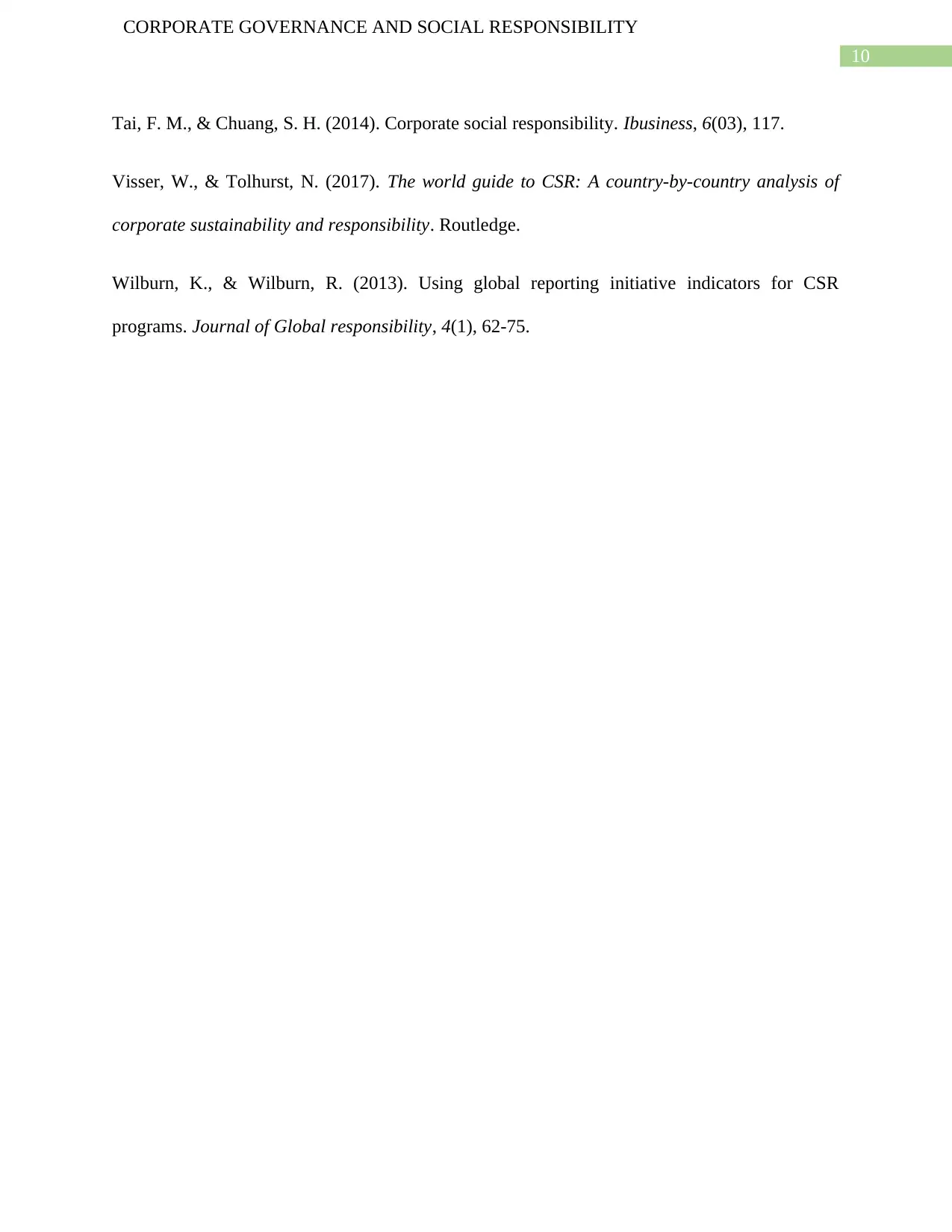
10
CORPORATE GOVERNANCE AND SOCIAL RESPONSIBILITY
Tai, F. M., & Chuang, S. H. (2014). Corporate social responsibility. Ibusiness, 6(03), 117.
Visser, W., & Tolhurst, N. (2017). The world guide to CSR: A country-by-country analysis of
corporate sustainability and responsibility. Routledge.
Wilburn, K., & Wilburn, R. (2013). Using global reporting initiative indicators for CSR
programs. Journal of Global responsibility, 4(1), 62-75.
CORPORATE GOVERNANCE AND SOCIAL RESPONSIBILITY
Tai, F. M., & Chuang, S. H. (2014). Corporate social responsibility. Ibusiness, 6(03), 117.
Visser, W., & Tolhurst, N. (2017). The world guide to CSR: A country-by-country analysis of
corporate sustainability and responsibility. Routledge.
Wilburn, K., & Wilburn, R. (2013). Using global reporting initiative indicators for CSR
programs. Journal of Global responsibility, 4(1), 62-75.
1 out of 11
Related Documents
Your All-in-One AI-Powered Toolkit for Academic Success.
+13062052269
info@desklib.com
Available 24*7 on WhatsApp / Email
![[object Object]](/_next/static/media/star-bottom.7253800d.svg)
Unlock your academic potential
Copyright © 2020–2026 A2Z Services. All Rights Reserved. Developed and managed by ZUCOL.





